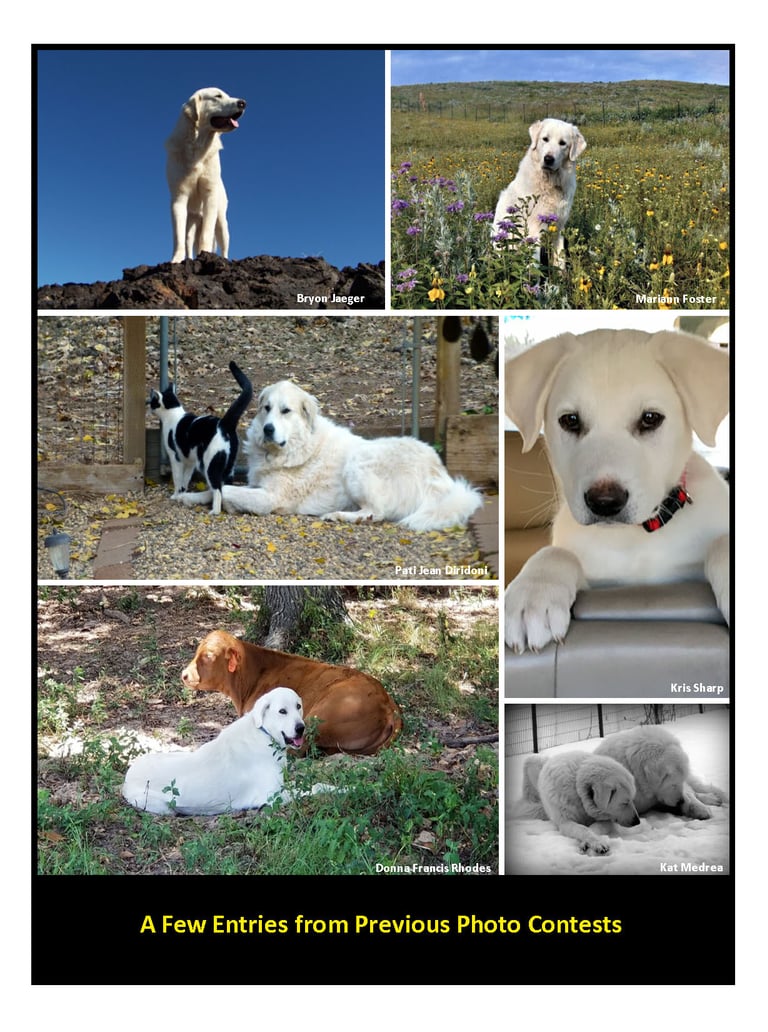Livestock Guardian Dogs
What is a Livestock Guardian Dog (LGD) and how are they different from other types of dogs?
Akbash Dog
The Akbash dog stands out among livestock guardian dog (LGD) breeds due to its unique combination of traits. Originating from Turkey, this breed is known for its striking white coat, which serves as excellent camouflage in rural settings. Unlike many LGDs, Akbash dogs possess a strong instinct for independence and are highly intelligent, making them adept at making decisions without constant guidance. They are also notable for their gentle demeanor towards livestock, forming strong bonds with them while remaining vigilant against potential threats. Their natural guarding abilities, paired with a calm and composed temperament, allow them to effectively protect flocks without unnecessary aggression. Additionally, Akbash dogs are known for their loyalty and protective nature towards their families, making them both remarkable working dogs and devoted companions. These characteristics combined make the Akbash a distinguished and effective guardian in pastoral settings.
The Akbash Dog is a remarkable breed known for its natural instincts and protective nature. Typically suspicious of unfamiliar dogs, the Akbash displays an intense, often aggressive demeanor when confronted with strange canines. However, this breed is not just a guardian against canines; it also protects livestock from winged predators, showcasing its versatility as a livestock guardian. With a deep-rooted sense of loyalty and an innate drive to defend its territory, the Akbash dog stands as a formidable protector. Its watchful eyes and keen senses make it an invaluable companion for those who require a dedicated guardian, ensuring safety and security in various environments.
Akbash Dogs are only for some. They shed copious amounts of hair, wander if given a chance, and compete with backhoes as excavators. The most serious drawback (which is also their strength) is behavioral. Akbash Dogs have been selected for millennia to act independently. They protect their property and charges without commands from people. Therefore, if they don't respect the people they live with or have reason to believe the children in their family (translate family = pack) might be in danger, Akbash Dogs may bite people or animals. Any dog that weighs over 100 pounds at maturity is likely to present behavioral problems to those who don't know how to raise and train a dog, maintaining firm discipline. This is true of all breeds, just amplified in protection breeds.
If you choose an Akbash Dog as a companion dog, you must be prepared to provide a LOT of early and continuous socialization for your pup as he matures into an adult. This includes taking him to puppy classes, and later, perhaps to obedience classes. Socialization means exposing the pup to other animals, places, people and things, like car rides, walking on-leash in traffic areas and entering buildings such as veterinary clinics. As a large breed, Akbash Dogs must be constantly supervised around children, until they are fully mature and reliable which can be up to 2 to 3 years of age. They are not automatic babysitters inside or outside the house, even though they generally like children, especially the children in their own family. Exposure to other dogs is critical, since the breed is naturally suspicious of and often aggressive towards strange dogs. This can be a serious problem in an urban environment where there are other pet dogs in close proximity, or when taking the Akbash Dog for a walk. Normally, they are not safe in dog parks, where they may take a dislike to another dog, or where a challenge from another dog may result in a fight.
The Akbash Dog is a breed that truly captivates dog lovers with its stunning appearance. Renowned for its striking beauty, the Akbash Dog's luxurious white coat gleams in the sunlight, exuding an air of elegance and grace. Their curled tail adds to their unique charm, giving them a distinctive silhouette that is both eye-catching and regal. Originally bred in Turkey to guard livestock, Akbash Dogs possess not only beauty but also strength and intelligence. Whether bounding through a field, standing watch, or going for a walk, the Akbash Dog exemplifies a perfect blend of beauty and purpose.
Livestock Guardian Dogs are found throughout the world. They live in suburbia, as members of families, and on farms and ranches, as protectors of sheep, goats, emus, alpacas, and poultry. Livestock Guardian Dogs are almost always selected for their protective instincts. They don't retrieve frisbees, excel in obedience training, or sit quietly in your lap, nor are they ideal show dogs due to their independent nature.
Livestock guardian dogs are experiencing a resurgence as the favored approach to protecting livestock. These remarkable canines, bred specifically to safeguard flocks and herds from predators, have proven to be both effective and reliable. Their natural instincts and protective behaviors help deter threats, allowing farmers and ranchers to reduce reliance on more conventional methods of livestock protection, such as fencing or livestock management practices. As more people become aware of their benefits, the demand for these dogs is increasing, leading to a revival in their use across various agricultural systems. This trend not only enhances animal welfare but also fosters a more sustainable approach to livestock farming, as these dogs work in harmony with nature to maintain the safety of livestock. With their loyal companionship and formidable presence, livestock guardian dogs are indeed reclaiming their important role on farms and ranches worldwide.


A livestock guardian dog (LGD) is a specialized breed of dog trained to protect livestock from predators such as wolves, coyotes, and bears. Unlike typical pet dogs, LGDs have a strong instinct to bond with livestock and will often live among them, forming protective relationships. Their primary role is to patrol the grazing areas and deter any potential threats, using their size, bark, and often their physical presence to ward off intruders. LGDs are usually larger, more independent, and exhibit a calm demeanor, making them well-suited for their guarding role. In contrast to herding dogs, which are trained to move animals, LGDs focus solely on protection, showcasing a unique set of traits that enables them to fulfill their crucial role in farming and ranching operations. Their effectiveness lies in their natural instincts rather than obedience training, setting them apart from conventional companion dogs.
Partnerships
Breeders and owners through education and collaboration.
contact@akbashdogs.org
Partners@AkbashDogs.org
© 2024. All rights reserved.
Supporting
Rescue
Rescue@AkbashDogs.org
